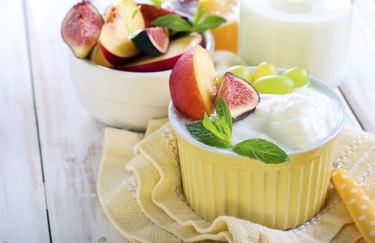
What you eat prior to hitting the field, ice, track or court can make or break your performance. A quality breakfast before a sporting event ensures you have the energy to do your best, but consuming the wrong types of food could lead to bloating, cramping and sluggishness. The composition and size of your breakfast depends on how far in advance of the event you eat.
Nutrition Composition
Video of the Day
The last thing you want during a competition is to feel hungry, lightheaded and without energy. A good breakfast staves off these feelings and can actually boost your performance. Your pre-exercise meal should provide carbohydrates, which are the body's primary source of immediate energy. Include a small amount of protein to help keep you full and provide essential amino acids. Minimize your fat intake at breakfast before an event. Fat takes longer to digest and may lead to bloating and digestive distress during competition. Avoid foods that are spicy or high in fiber, too.
Video of the Day
Calorie Intake
The number of calories in your breakfast depends on how many hours you have before the competition. If breakfast falls three to four hours before competition, eat a substantial meal consisting of 400 to 600 calories. Some athletes may eat up to 1,000 calories, but no more because you won't have time to digest the food before you play. If you've only got a couple hours before you compete, 200 to 400 calories is sufficient. When you sleep in and only leave an hour before you have to perform, go for just 100 to 150 calories.
Menu Items
A full breakfast you eat three or more hours before an event could include scrambled eggs with toast and fruit, pancakes with yogurt and sliced bananas, or a bowl of oatmeal with raisins, milk and brown sugar. If the window before your workout is only two hours, stick to a bagel with jam, a cup of yogurt with a piece of fruit or an energy bar. A banana, a couple of fig bars or a handful of raisins is an example of a 100- to 150-calorie quick pregame breakfast to eat within an hour of the event.
Hydration and Liquid Nutrition
Some people prefer a liquid breakfast before a sports competition. Liquids tend to digest more quickly and may be less likely to cause stomach upset. A fruit smoothie that combines yogurt, frozen berries and milk is a good choice if you have two or three hours before game time. If breakfast falls just an hour before your event, have a sports drink that will provide you with quick-digesting carbohydrates for immediate energy. Drink plenty of water and avoid caffeinated beverages in the two hours prior to the event. Hydration directly affects performance, and the caffeine may cause you to visit the port-a-potty often -- leading to dehydration and disruption in play.